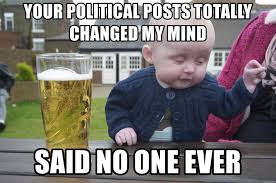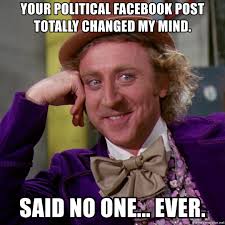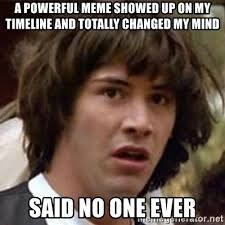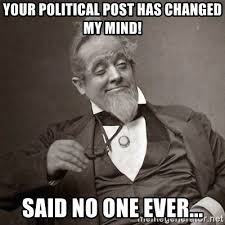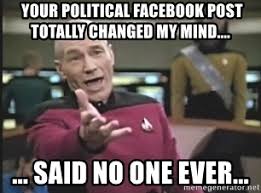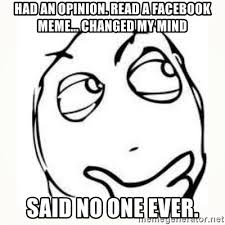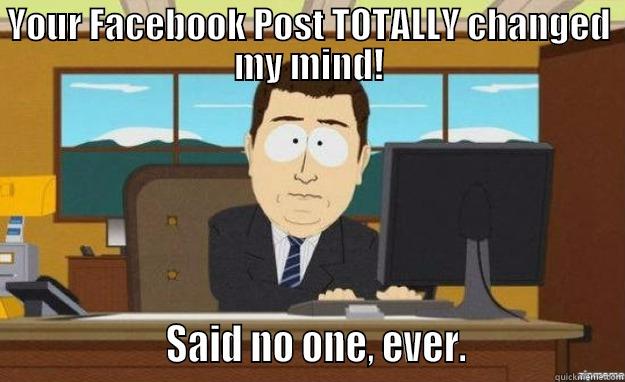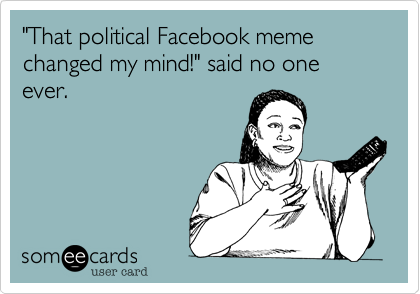A Cautionary Tale of Sarcasm in Social Media–Ross v. City of Jackson
An unspecified Facebook friend of Ross posted a meme that was something like this:
Ross favors gun control. He replied with a comment: “Which one do I need to shoot up a kindergarten?” Perhaps feeling satisfied that he had won the Internetz with his comment, he logged off Facebook and went to bed.
A cousin of the Facebook poster screenshotted the post before the poster deleted it. The cousin forwarded the screenshot to another cousin who forwarded it to her husband, a cop, who forwarded it to his police co-workers. Based solely on the screenshot and without doing any further investigation or interviewing Ross, the officers arrested Ross at work nearly 24 hours later, nominally on the basis that he had made a “true threat.” After the arrest, Ross explained his comment as a joke, but he was still jailed for several days and charged with “peace disturbance” before he posted a bond. A couple of months later, the charges were dropped.
Ross sued for deprivations of his civil liberties (42 USC 1983). The district court dismissed his claims, saying the officers had qualified immunity. The appeals court reversed and remanded:
The officers were justified in their efforts to investigate Ross’s post. In current times and in light of current events, the statement demonstrated, at a minimum, questionable judgment. But the state statute at issue does not apply to any speech that is not a “true threat,” and—under Missouri precedent—a reasonable officer would have understood that. And if any further investigation had led the officers to believe there was an immediate or imminent danger, they would have been justified in acting on that information. Here, however, no exigent circumstances prevented the officers from gathering additional information before making an arrest.
In this case, even a “minimal further investigation” would have revealed that Ross’s post was not a true threat. The officers conducted no investigation into the context of the statement, Ross’s history of violence, or Ross’s political beliefs about gun ownership or gun control measures. Viewing the evidence in the light most favorable to Ross, the officers saw the comment, discovered where Ross worked, and then went to his job site with the sole intent of placing him under arrest. Ross tried to explain what was meant by his comment and provide the officers with more context about the post, but the officers did not give him that opportunity until after he was booked at the police station. And, after interviewing Ross, officers indicated that they did not think the charges would stick, i.e., they did not believe he had truly made a “terrorist threat.” Ross was nonetheless charged and held in custody for several days until he was able to post bail. In sum, it is beyond debate that—had the officers engaged in minimal further investigation—the only reasonable conclusion was that Ross had not violated [the law].
The opinion doesn’t use the term “sarcasm” or “humor,” but the court explains that Ross’ comment clearly wasn’t a “true” threat: “The comment was in the form of a rhetorical question, which identified no school where a shooting would happen. And the comment was made on a social media website that the Supreme Court has recently called ‘a quintessential forum for the exercise of First Amendment rights” analogous to “a street or park.'”
So…what went wrong here?
#1: local law enforcement are often the subject of pejorative stereotypes, which unfortunately their conduct in this case seems to reinforce. Why didn’t the officers even interview Ross before arresting him? One obvious hypothesis is that they were biased against gun control supporters. Why didn’t the officers do more online investigation of Ross? The Facebook thread was deleted, so it was no longer easily investigated, but one obvious hypothesis is that they were technologically unsophisticated. Maybe it never occurred to them that the screenshot might be a fake? And why didn’t law enforcement release Ross after doing the post-arrest investigation, instead of charging him with a different and pretty obviously bogus crime (the “peace disturbance”)? At that point, they had enough time to know that any “peace disturbance” charge had very serious First Amendment problems. See, e.g., the Drahota case. Perhaps they needed to charge Ross with something to pretextually (and unconvincingly) justify the initial arrest. Law enforcement is charged with keeping its citizens safe, but the officers’ conduct here makes me feel less safe.
#2: Online content often doesn’t transplant well to other contexts, as illustrated here. Screenshotting the post and then forwarding it around the family takes the conversation to people pretty far removed from a conversation between Facebook “friends” who might have a lot of additional context to understand each other. I’d like to know more about why the cousins did what they did. At minimum, the consequences of the cousins’ behavior are a cautionary tale for anyone who screenshots social media content and forwards it to unintended audiences. In this case, Ross’ transplanted comments caused him to wrongly go to jail and have to defend bogus criminal charges for months. I suspect that’s not what the initial screenshotter intended, but it’s not a completely unforeseeable outcome from the content replanting.
#3: Ross is the victim here, but his choices are still instructive. When we comment on our friends’ social media posts, we aren’t just talking with our friends–we are talking with their friends and colleagues, which might include hundreds or thousands of people from opposite sides of any political spectrum whose heads are in an entirely different place. So even if you and your friend are politically simpatico, it’s possible/likely that your friends’ friends are not necessarily on the same program. Indeed, if we are ever going to escape filter bubbles, this viewpoint diversity is ultimately a good thing. However, it also means our unexpressed biases can get us into trouble, like Ross’ assumption that readers would get the joke. Based on my personal views on gun control, I instantly knew that Ross was making an anti-gun control comment; but I can easily see how people with different views about guns (mis)interpreted Ross’ comments as a declaration of his personal agenda. Social media collapses disparate audiences into the same virtual space in ways that guarantee misunderstandings and unexpected outcomes. This is one of many reasons why social media is a terrible environment for political “discourse”–and for sarcastic “humor.”
#4: For those reasons, Ross’ failed Facebook comment brings to mind another meme:
Case citation: Ross v. City of Jackson, 2018 WL 3581468 (8th Cir. July 26, 2018)
Nomenclature note: I believe this is the first federal appellate opinion to discuss Internet photo “memes’ using that word.


